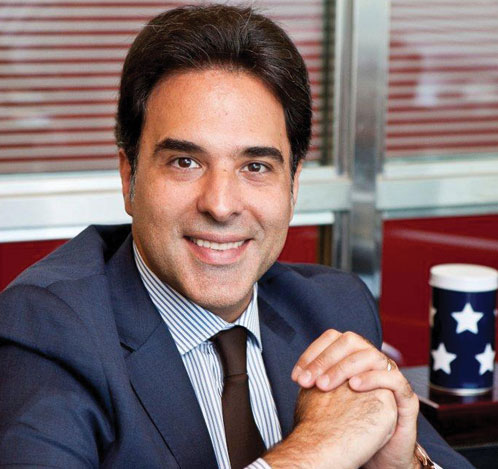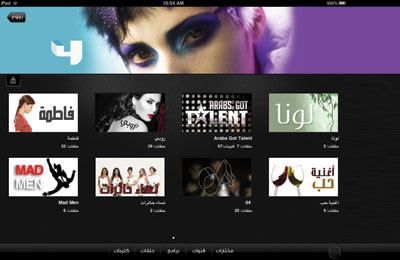
After more than 40 years of operation, DTVE is closing its doors and our website will no longer be updated daily. Thank you for all of your support.
Interview: Mazen Hayek, commercial director, MBC
MBC’s commercial director and official spokesman Mazen Hayek says the firm is making a push towards content localisation and multi-screen delivery. Andy McDonald reports.
 Middle Eastern broadcaster MBC launched two channels last year: Al Arabiya Al Hadath, an extension of its Al Arabiya News Channel dedicated to live events and developing stories; and MBC MASR, a general entertainment channel aimed specifically at the Egyptian market.
Middle Eastern broadcaster MBC launched two channels last year: Al Arabiya Al Hadath, an extension of its Al Arabiya News Channel dedicated to live events and developing stories; and MBC MASR, a general entertainment channel aimed specifically at the Egyptian market.
While the latter reveals a greater effort by the firm to localise its output to specific territories, MBC group director for commercial and PR Mazen Hayek says that more channel launches are not the only way to achieve this – targeting and packaging popular shows in the right way for different markets and developing MBC’s cross-platform delivery strategy are key areas that it is looking at.
Multiscreen delivery
“For us, the way forward is going to be towards increased localisation of content and multiscreen delivery. As the world is watching more media on smart devices like tablets, PCs, smartphones, mass media needs to be able to deliver content to all of these,” Hayek says. “The future may not be only in the number of channels you launch, but rather in your ability to connect with audiences through various platforms…Content is King, yes, but content still has to be rightly packaged, rightly delivered, sharply targeted and obviously promoted. So we continue to expand and grow our market share in audience terms as well as in commercial terms, both on pan-Arab levels and on local levels.”
MBC launched in 1991 as the first private free-to-air satellite broadcasting company in the Arab World. In 2011 the now Dubai-based firm started to air seven of its channels in HD and currently has a suite of 12 channels broadcasting a range of content –including movies, news, family content and general entrainment. It is also home to Arab world adaptations of popular formats like Got Talent, The Voice and Idol.
Though these shows are done cross-regionally, Hayek says that in the future, for flagship programmes such as game-shows and talk-shows “we will eventually tailor-make them to the likes and dislikes of specific markets”. Localisation at the content level is important for satellite broadcasters, which, by their very nature, broadcast to broad regions, he says.
“If you take Egypt, what you watch on MBC Masr in Egypt is purely tailored to the taste of the Egyptian market, which may differ from the Gulf consumer. So the MBC1 network differs from MBC Masr, though both are general entertainment channels,” says Hayek.
Alongside its suite of channels, MBC has a number of online portals. These are its main MBC.net site, a news site for its Al Arabiya news channel, and a video-on-demand portal called Shahid.net, the latter of which has proved important as MBC looks to tap into the growing trend for accessing content online.
Shahid lets viewers catch up on MBC’s on-air programming as well as content from other channels in the region such as Alhayat, Alqahira Wal Nas and DW and has grown substantially from its 2010 launch.
Since January 2012 alone, the site has had more than 99 million visits and more than 140 million video views and is growing its monthly unique visitor count at a rate of 110% year-on-year. It currently counts roughly 2.9 million unique users with MBC also notching up 600,000 downloads for the Shahid iPad app, which it launched in mid-2012.
“The growth potential of the web delivery is huge and we want for Shahid to be the best library of video-on-demand and premium content and user-generated content in this part of the world,” says Hayek, claiming that it has “grown in a way that it became comparable in size to one of our TV channels.”
The free, ad-supported site is also proving increasingly attractive from a business point of view. “Advertisers on Shahid are growing at a much higher rate than the advertisers on TV, though some of the advertising is bundled and linked to what we offer on TV – like in the case of Arab Idol, The Voice and Arabs Got Talent,” says Hayek. However, he claims that the growth in non-bundled advertising shows the growing importance of online platforms as a whole.
This is especially pertinent as MBC’s business model revolves around “free, as opposed to fee.” Currently, only one of MBC’s linear channels – MBC+ Drama on the Orbit Showtime Network – is subscription-based, and Hayek says it is “very committed” to sticking to this model.
Free culture
“The culture in our region is still a free culture. So far we are able, thanks to our advertising support, to offer the best content for viewers for free – such content would definitely be paid in other markets or on other platforms. I’m not saying we will not eventually launch premium propositions that will require subscriptions, but most of our business model is based on advertising income as opposed to viewer- or browser-subscriptions,” says Hayek.
Competition is increasing in the international VOD space, with the likes of US-based Netflix marking their global intentions by rolling out its service to new territories.
So far Netflix has expanded its streaming service out into Canada, Latin America, the UK, Ireland and the Nordic territories. Though it has not disclosed its future plans, or commented on whether it is interested in markets like the Middle East or Asia, Hayek believes any efforts to do so could also open up opportunities for firms like MBC, as foreign firms often opt to “partner with local players because they are more culturally relevant and market relevant and they know the consumer.”
Whether Netflix’s subscription-based model could work in the Middle East is unclear. However, Hayek believes that for MBC there is a lot of potential in the advertising space, with plenty of room to grow due to the fact that ad rates are currently so low.
“Ad spend per capita in the region is estimated at around US$40 (?31) per capita. If you look at the Gulf, it will probably be in the US$65 per capita compared to US$400, US$500 or US$600 elsewhere, which tells you that there is a huge potential for the advertising market to grow compared to developed markets in Europe or the US,” says Hayek.
He adds that there is also more potential to unlock ad revenues in different specific markets in the Middle East – something that will fit neatly with its content localisation plans. “Advertisers got used to planning, buying and optimising their media spend with Saudi Arabia primarily in mind, and get a free overspill in other 20 markets in the Arab world,” says Hayek – something that can be improved upon.
Another trend he predicts is for more market consolidation: “This is a region that has 700 free-to-air satellite channels in 21 Arab countries for probably 350 or 400 million inhabitants. Consumers and advertisers have sent the whole market clear signals for the last couple of years, whereby the top 15 channels in the region account for something like 70% viewing share and audience share and commercial revenue share. If you take the top 50 channels, you’ll get to something like 90 or 95% audience share and commercial revenue share. Which leaves you with 650 free-to-air channels struggling for 5% or 10% max of the market.
“This leads to the need for greater consolidation, and probably mergers and acquisitions, so it’s impossible to leave that huge number unless there is subsidies, government support or personal agendas by which one is ready to just have a TV channel and lose money for having it,” says Hayek.
Though MBC’s strong standing in the Middle East has stood it in good stead to date, Hayek believes that linking up its on-screen TV, online and on-air radio content, and providing the best locally produced content that caters for the tastes of local markets, is where its future opportunities lie.
“Growth indicators will not be measured necessarily only by the number of new channels you create. But rather by the premium content you’re able to provide, by the amount of engagement and bonding with consumers – by your ability to remain ahead of the competition and provide the audience with an unparalleled and incomparable experience.”




